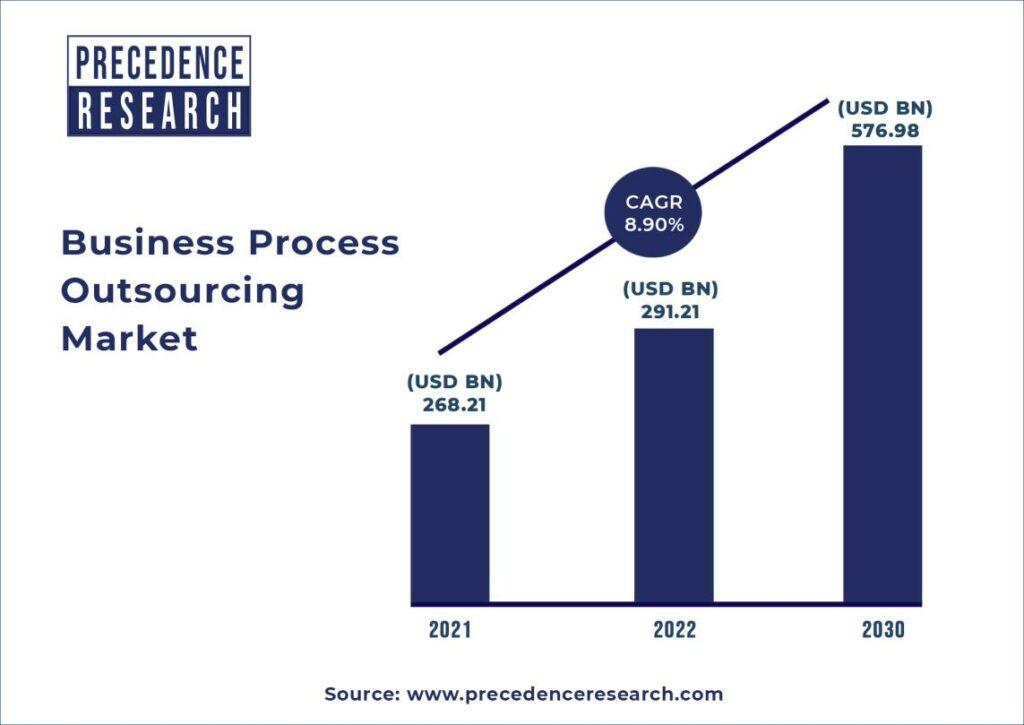Efficiency has always been important in the business world. Companies must contend with fierce global market competition in today’s interconnected world. Effective work processes can make the difference between success and failure in this situation.
But simply organizing these efficient workflows is insufficient. It needs to be supported by creative mindsets and dependable yet adaptable management. The infrastructure needed to implement and manage such business process services isn’t present in every company, though.
Business process outsourcing, or BPO, enables companies to deploy top-notch procedures without the required infrastructure. Let’s examine BPO and discover what it does, the different BPO services, and how it can help a business.
What exactly is BPO (business process outsourcing)?
Business process outsourcing (BPO) is a method of conducting business in which a company hires an outside service provider to carry out a crucial duty or task.
After identifying a process that, while necessary for its operations, is not part of its core value proposition, an organization typically contracts with another company for these services. Strong business process management and a thorough understanding of organizational processes are necessary for this step. Payroll and accounting are two examples of processes that are frequently considered to be good candidates for BPO by many organizations.
Calculating that hiring a company that specializes in these processes for outsourcing could produce better results. Enterprise executives frequently decide there is little value in having their own staff performs these commodity processes because they typically do not distinguish one organization from another. Companies estimate that outsourcing these processes to an expert provider could result in better outcomes. BPO’s origins are in the manufacturing sector. After deciding that outside vendors could bring more expertise, speed, and cost efficiencies to those processes than an internal team could, manufacturers hired them to manage some aspects of their supply chains. Organizations in other sectors eventually started using it.
Today, a variety of tasks are being outsourced to service providers in the United States, other countries in North America, and even government agencies due to the growth in the use of BPO.
In 2021, the size of the worldwide BPO market was estimated at $268.21 billion USD. Businesses’ growing focus on improving firm agility to survive the constantly changing business dynamics, as well as strategies to boost efficiency while cutting operating expenses and focusing on core competencies, may benefit the business process outsourcing industry. Businesses are also increasingly concentrating on reducing the cost of doing business in order to access global resources in order to meet the expanding industry demands. As a result, an increasing number of businesses globally are embracing the benefits of business process outsourcing services to concentrate on their core competencies and consequently create new market opportunities. (Source: Precedence research)

What Kinds of BPO Companies Exist?
Whether a company contracts its operations within or outside of its home country will determine the scope of its BPO options.
- BPO is referred to as “offshore outsourcing” if the contract is transferred to a nation with stable political conditions, lower labor costs, and/or lower taxes. One such instance of offshore outsourcing is a U.S. company using a Singaporean BPO vendor.
- When a job is contracted to a neighboring nation, BPO is referred to as “nearshore outsourcing.” This would be the case if a U.S. business teamed up with a Canadian BPO provider.
- When BPO is contracted within the company’s own nation, even if its vendor partners are based in different cities or states, this is referred to as “onshore outsourcing” or “domestic sourcing.”
Because it depends on technology and infrastructure that enables external companies to effectively carry out their roles, BPO is frequently referred to as information technology-enabled services (ITES).
Why is BPO employed?
Businesses use business process outsourcing primarily for the front-office and back-office portions of their operations.
The term “back-office functions,” also known as “internal business functions,” refers to support activities like accounting, IT services, HR, quality assurance, and payment processing. Customer relationship management, marketing, and sales are a few examples of front-office activities and business operations that relate to or serve current and potential customers. Some businesses hire just one vendor to handle an entire function, like the HR division. Some businesses only outsource particular tasks within a functional area, such as payroll processing, and handle all other HR tasks in-house.
Processes that are frequently outsourced include the following:
- accounting and payroll
- administration
- customer service
- IT services and management
- Production
- shipping and logistics
- research
- marketing
Additionally, some businesses outsource strategic tasks like data mining and data analytics, which are now crucial components of preserving a competitive advantage in the digital economy.
The most frequently outsourced functions are IT, finance, and payroll, according to Deloitte’s “2021 Global Shared Services and Outsourcing Survey Report”.
Why are Business Process Outsourcing Companies Needed by Brands?
Maximizing profitability through outsourcing
Numerous factors influence the decision of businesses to outsource their work. The general consensus is that businesses favor outsourcing because of the tax benefits that come with employing qualified workers abroad. But primarily that is political propaganda.
While moving a business overseas does provide some tax benefits, outsourcing is not specifically covered by any laws, according to Politifact. The truth is that businesses prefer to outsource because they only have to pay the host country’s tax rate because the corporate income tax rate in the US is relatively high.
This boosts sales in addition to a number of other factors, like:
Reduce expenses and costs
A company can reduce labor costs by outsourcing work processes to nations with lower costs of living. Companies can also save on moving and acclimatization expenses for their talent since these workers reside in their states. In the US, where the average corporate tax rate is 39.1%, this is particularly true.
Focus on the essential tasks
The best course of action is to outsource the business processes that are not essential but still have an impact on regular operations at your company. For instance, the business can easily outsource payroll and accounting tasks without having an impact on performance. Additionally, outsourcing them frees the business from having to monitor them so it can concentrate on the tasks that really matter.
The effectiveness of supplemental services can be increased
Companies that outsource frequently offer services for supplemental or non-core business functions. Additionally, because it is their area of expertise, the work is of a much higher caliber than if the company had employed an internal team. Additionally, they would require more sophisticated tools that might be too expensive for their customers. As an illustration, a company would like to know how to hire web developers for a project without squandering their limited resources. In this situation, they would be best served by choosing a software outsourcing business that focuses on web development.
For the Purpose of Global Expansion
Utilizing outsourcing firms also enables businesses to grow and serve clients from various racial and cultural backgrounds. Outsourcing your customer support to nations like these can assist you in offering a higher standard of service because the locals are better equipped to comprehend and communicate with their fellow citizens.
Utilizing BPO firms has advantages and disadvantages in the modern world. For starters, if your BPO provider decides to terminate the contract for any reason, you might find yourself stuck during a crucial period for your company. However, the benefits greatly outweigh the drawbacks.
There are only so many hours in a day that can be spent working. By using business process outsourcing, we can get the most done in a day. Similar to that, it will let you manage a variety of talents without having to hire them yourself.
You must outsource your business process if you want to succeed. However, make sure to develop backup plans for the hired.
Benefits of BPO Cost Effectiveness
For a number of reasons, outsourcing operations results in greater cost savings than hiring your own staff.
- Because of economies of scale, specialized processes, low-cost countries, and other factors, providers of outsourced services can finish business processes for less money.
- American businesses can save on taxes by outsourcing.
- Businesses that outsource their business processes are not restricted to fixed-cost models and can instead use variable-cost models like fee-for-service plans.
- BPO reduces the amount of office space required to house employees, saving money on real estate.
Increased Flexibility
Organizations can use their internal resources for core competencies and crucial business functions by outsourcing non-critical tasks.
By modifying their processes as the market changes, BPO also enables businesses to respond more quickly to shifting market dynamics. For instance, you won’t have to worry about out-of-date technology if you don’t spend money on internal servers.
Better Performance and Quality
For various processes, businesses can employ specialized BPO service providers. The work produced by outside service providers, such as web developers or content marketers, will be more specialized and therefore of higher quality. Additionally, they will produce more.
More Advantages in the Market
Companies can devote more time and energy to the processes that set them apart in the marketplace because they typically outsource non-critical business functions like financial services.
Increased skill diversity
When hiring outside of one’s city or country, there is frequently more of a chance for a diverse range of specializations and skills. Hiring a qualified candidate with specialized experience is simple with outsourcing.
More presence abroad
Businesses can offer services in a variety of languages and time zones thanks to BPO. Credit card companies like MasterCard use BPO for customer service, as I mentioned in the video above. The availability of multiple languages not only improves customer satisfaction and experience, but it also increases their global presence.
What dangers do BPOs pose?
A few BPO risks are as follows:
- Breaches of security. As organizations frequently need to share sensitive and regulated data with their service providers, the technology connection between the hiring company and the BPO provider creates another point of entry for bad actors.
- Regulations that must be followed. The regulatory requirements of an organization apply to its outsourced work as well, so it must make sure that the vendors it hires comply with the laws the organization must abide by and the regulations that apply to its outsourced work.
- Higher or unexpected costs. The amount of work that needs to be done can sometimes be underestimated by organizations, which can result in higher costs than expected.
- Relationship difficulties Organizations may experience communication issues with their contracted service providers or discover that there are cultural differences.
- Excessive reliance on outside providers. When a company outsources a task or service, it is bound to the partner who completes the work. To make sure that important goals are achieved at the agreed-upon cost, the organization must manage that relationship. If not, it might be challenging for the company to move the contract to another outsourced provider or even bring the operation back in-house.
- Greater likelihood of disruption. An organization needs to keep an eye out for problems that could sever or otherwise disrupt its relationship with an outsourced provider. These include issues with the outsourced provider’s finances or employees, unrest in the world’s politics, natural disasters, or adjustments in the economy. Businesses must take these risks into account and develop coping mechanisms, which increases the complexity of their business continuity and disaster recovery plans.
Why you should think about business process outsourcing in 2022?
The market for business process outsourcing (BPO) is still expanding quickly. The market, which is currently valued at $232 billion globally and has projections for continued growth over the next five to ten years, is supported by the daily uncertainty that companies of all sizes deal with. Businesses are under pressure to become as agile as possible and to be able to operate successfully in a changing and frequently unpredictable environment because of rising costs, technological advancements, intense competition for talent, and huge pressures on staffing and recruitment.
Due to the uncertainty, businesses are starting to think about the advantages of BPO and how the right partner can assist them in navigating this difficult environment while delivering what’s crucial—creating valuable, positive customer experiences.
BPO firms must stay ahead of the competition in light of the intriguing outsourcing trends if they are to meet customer demands. Here is a list of a few interesting outsourcing trends for 2022 that may be forward-thinking and advantageous for BPO companies.
Increasing Remote Work
The COVID-19 pandemic has significantly altered the working schedule all over the world. Companies have been forced to restructure their work processes to include remote work due to the pandemic. Additionally, remote work will continue in 2022 as another pandemic wave is expected this year. Businesses are now recognizing the advantages of remote work, and this trend has increased by 159% since 2009. Businesses can easily start their operations anywhere while outsourcing as a part of their global expansion thanks to cloud infrastructure and technological advancement.
Accentuate the use of social media management tools
Prior to 2000, Interactive Voice Response (IVR) and websites were the only methods used by the customer service sector to route calls to the appropriate agents.
Now that 79% of Americans have a social media account, there has been a noticeable change in consumer behavior. Recently, browsing social media has risen to the third-place spot among online activities.
Social media has changed the game, and businesses are now aware of this. It offers an extraordinary amount of consumer data and feedback, which can improve a business’s capacity to predict future trends and to innovate.
This change in customer management presents a sizable opportunity for BPO service providers. BPOs have been making investments in the equipment and skills necessary to provide a variety of social media management services over the past few years.
These services include everything from monitoring social media to gathering business intelligence and taking customer feedback into account.
Additionally, a lot of BPO service providers are putting money into social media service teams. When social media teams and customer service agents collaborate, they can address customer complaints much more quickly, improving customer satisfaction and experience.
It is anticipated that this trend of investing in new technologies, tools, and teams to provide customers with better social media management will continue in 2022.
Services for Cloud Computing
According to Forbes, over 77% of businesses have one or more apps, and the majority of them use cloud computing services. Cloud computing is being used by small and medium-sized businesses to outsource a few non-core business functions. The increased use of cloud computing has aided organizations in business continuity, agility, resilience, high data security, and other areas as one of the most popular trends in outsourcing.
Solutions for Omnichannel
The majority of BPO companies today swear by omnichannel solutions and unified communication tools to provide excellent customer service, making them one of the most promising outsourcing trends for 2022. Since BPO companies are technologically savvy, they can create and facilitate the tools and resources necessary to create an integrated omnichannel experience. In this manner, the omnichannel solution will eventually assist outsourcing businesses as well as customers in improving the customer experience.
Openness
Since transparency is necessary to maintain a highly competitive market environment, it is regarded as one of the promising outsourcing trends. The trust between vendors and BPO companies must be maintained at a high level of transparency. Due to improved information access, effective strategic partnerships produce better investment options and spur business innovation. Small and medium-sized businesses have pushed BPO companies to be more transparent when negotiating contracts.
In 2022, the global outsourcing market is expected to grow favorably.
The pressure on businesses to operate cost-effectively in combination with growing competition from new outsourcing destinations will be the forces behind the industry’s accelerated growth.
Future & Endnote
In the years 2020 to 2024, the global business process outsourcing market is expected to grow by $76.9 billion, according to Technavio.

According to a report from international real estate firm Cushman & Wakefield, the industry will continue to grow by 6% annually for the next six years despite cost-cutting by businesses.
The outlook for the trends in global outsourcing in 2022 is both difficult and promising. In conclusion, businesses that outsource their business processes are getting more competitive and concentrating on strategic alliances that yield more promising outcomes. BPO agencies can gain deeper insights for managing the resources and remaining on trend this year by keeping up with the most recent developments and current outsourcing trends. Consider working with ERIKROOT if you’re looking for a trustworthy outsourcing partner. At IREKROOT, we work hard to provide premium outsourcing services to our clients at competitive prices.
